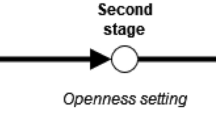Abstract
Two-sided platforms coordinate two types of users in order to increase the value of the whole system surrounding the platform. Users of a platform have different outside opportunities, and these influence their behavior on the platform. Platforms often limit these outside projects through restrictive licensing agreements. These are often thought to reflect market power and a foreclosure motivation, but it shows that they can be a way of managing the “quality commons” aspect of a platform. This chapter analyzes a platform where all component developers produce two kinds of quality—inside quality for their offerings on the platform and outside quality on their outside project. It shows that there are cases where restrictive licensing agreements that shut down the outside projects can increase social welfare, while in other cases they reduce social welfare. The reason is that if consumers and the platform value components inside quality enough, all agents prefer to be protected from low-quality behavior, even at the cost of giving up outside projects.
Access this chapter
Tax calculation will be finalised at checkout
Purchases are for personal use only
Similar content being viewed by others
Notes
- 1.
One piece of evidence for quality commons in shopping malls is that rental contracts commonly include “cotenancy” clauses that result in reduced rent if other tenants leave the mall. See, e.g., Fung (2018).
References
Armstrong, M. 2006. Competition in Two-Sided Markets. RAND Journal of Economics 37: 668–691.
Boudreau, K. 2010. Open Platform Strategies and Innovation: Granting Access vs. Devolving Control. Management Science 56 (10): 1849–1872.
Boudreau, K., and A. Hagiu. 2009. Platform Rules: Regulating the Ecosystem Around a Multi-Sided Platform. In Platforms, Markets and Innovation, ed. Annabelle Gawer. Edward Elgar.
Church, J., and N. Gandal. 1992. Network Effects, Software Provision, and Standardization. The Journal of Industrial Economics 40 (1): 85–103.
Fung, E. 2018. Sears Closing Stores Is a Blessing for Some Landlords, a Curse for Others. Wall Street Journal, October 16.
Gilbert, R.J., and M.L. Katz. 2011. Efficient Division of Profits from Complementary Innovations. International Journal of Industrial Organization 29 (4): 443–454.
Hagiu, A. 2006. Pricing and Commitment by Two-Sided Platforms. RAND Journal of Economics 37: 720–737.
Hagiu, A. 2009. Quantity vs. Quality and Exclusion by Two-Sided Platforms. papers.ssrn.com.
Hagiu, A., and J. Wright. 2018. Platform Minimum Requirements. Working Paper.
Hogendorn, C., and S. Yuen. 2009. Platform Competition with ‘Must-Have’ Components. Journal of Industrial Economics 57 (2): 294–318.
Katz, M., and C. Shapiro. 1985. Network Externalities, Competition, and Compatibility. The American Economic Review 75 (3): 424–440.
Rey, P., and T. Vergé. 2008. Economics of Vertical Restraints. In Handbook of Antitrust Economics, ed. Paolo Buccirossi, 353–390. MIT Press.
Rochet, J., and J. Tirole. 2003. Platform Competition in Two-Sided Markets. Journal of the European Economic Association 1 (4): 990–1029.
Schuett, F. 2012. Field-of-Use Restrictions in Licensing Agreements. International Journal of Industrial Organization 30 (5): 403–416.
Stennek, J. 2014. Exclusive Quality—Why Exclusive Distribution May Benefit the TV-Viewers. Information Economics and Policy 26: 42–57.
Author information
Authors and Affiliations
Corresponding author
Editor information
Editors and Affiliations
Rights and permissions
Copyright information
© 2020 The Author(s)
About this chapter
Cite this chapter
Hogendorn, C. (2020). Platforms with Restrictive Licensing. In: Alleman, J., Rappoport, P., Hamoudia, M. (eds) Applied Economics in the Digital Era. Palgrave Macmillan, Cham. https://doi.org/10.1007/978-3-030-40601-1_10
Download citation
DOI: https://doi.org/10.1007/978-3-030-40601-1_10
Published:
Publisher Name: Palgrave Macmillan, Cham
Print ISBN: 978-3-030-40600-4
Online ISBN: 978-3-030-40601-1
eBook Packages: Economics and FinanceEconomics and Finance (R0)




